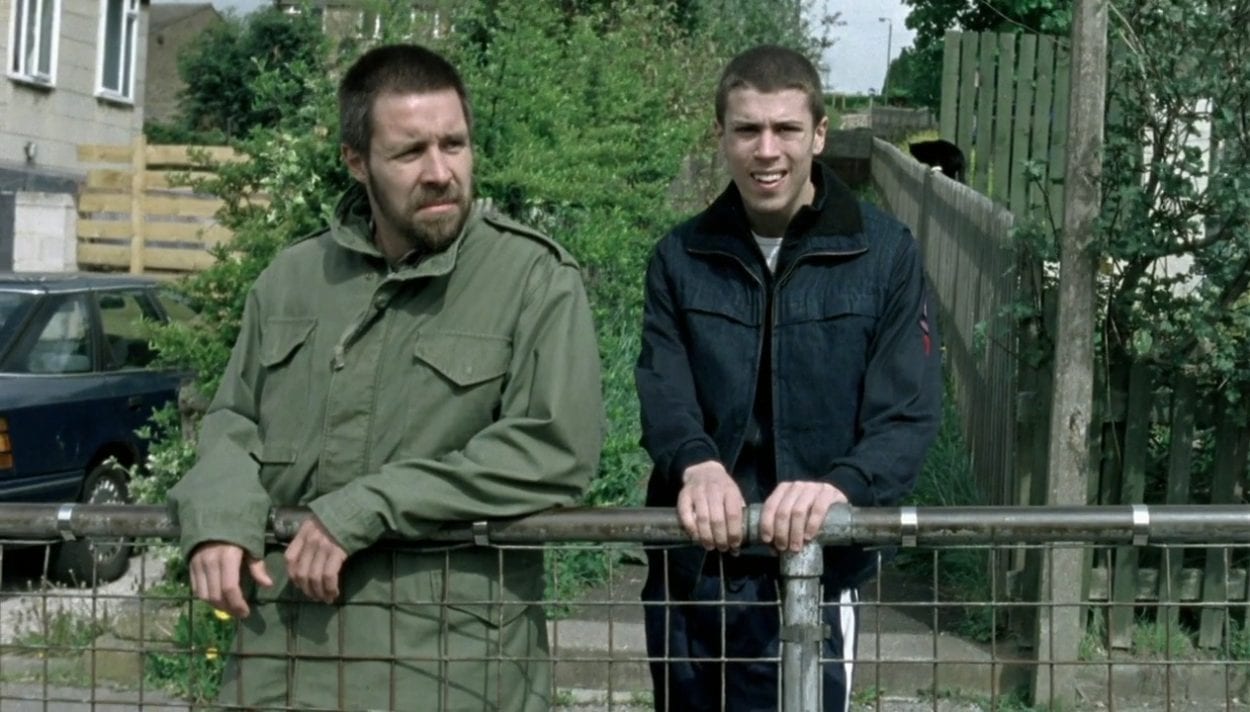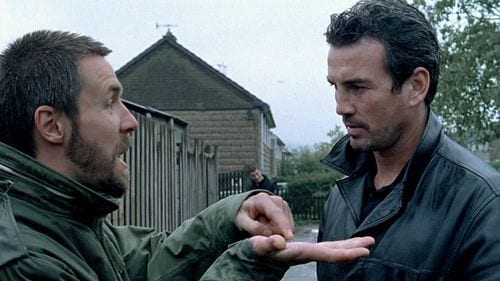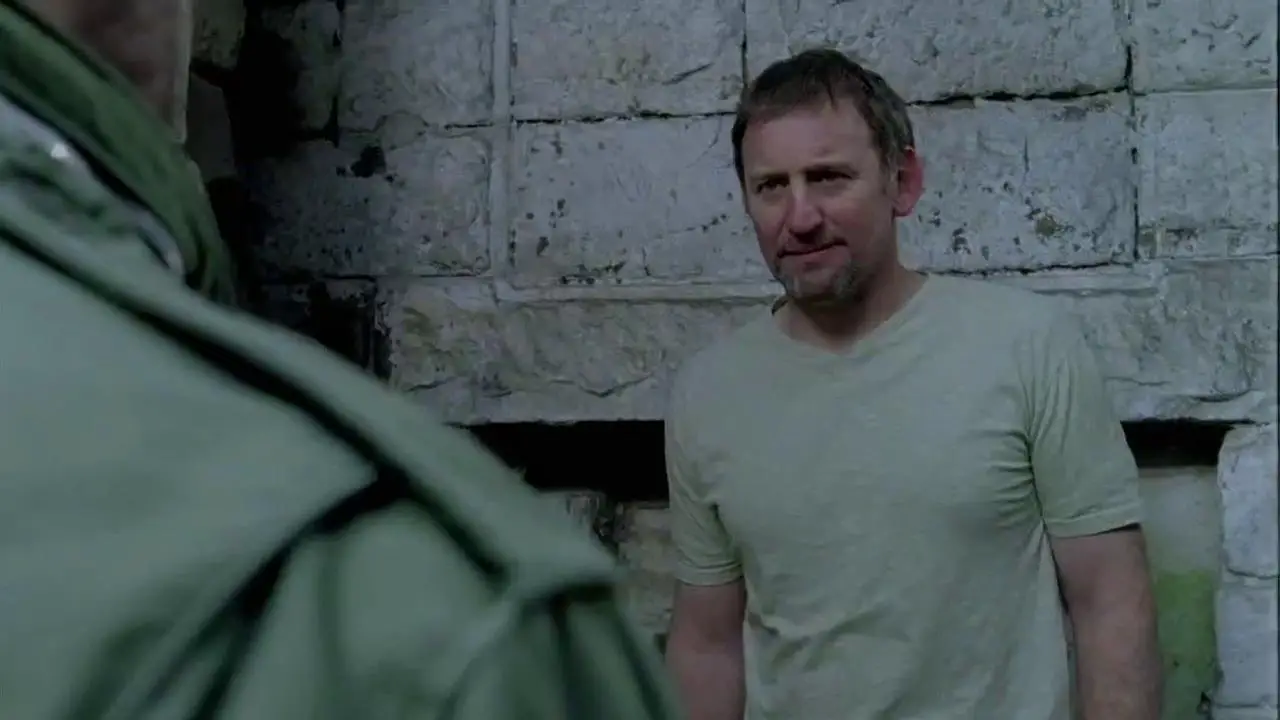Dead Man’s Shoes is a 2004 British psychological thriller directed by Shane Meadows, also known for his turn at directing theThis is England film and mini-series. The British writer/director would share writing duties with Paul Fraser and Paddy Considine, the latter of the two also takes on the lead role of Richard. Toby Kebbell co-stars as Richard’s mentally-impaired younger brother Anthony. The film also stars Gary Stretch, Paul Hurstfield and Stuart Wolfenden in supporting roles.
The narrative of Dead Man’s Shoes focuses on Richard, a British paratrooper returning to his former Derbyshire hometown of Matlock. The reason for his return is that he seeks recompense for his brother who was the victim of brutal mental and physical abuse at the hands of a group of local thugs. Richard and his younger brother make base at a local farm, Anthony staying behind as Richard descends on the sleepish English town to exact his revenge.

From the very first interaction that Richard has with one of the group of wrongdoers, we are made to understand that this man is not to be trifled with. Meadows and Considine do an excellent job of setting the table for what’s to come. It is evident that Richard is a ticking time bomb, his fury is just simmering beneath the surface. He is like a well-honed attack dog just waiting for the command to be let off the leash. The only difference is that this time the command is not from an exterior master, it comes from within his own psyche.
Considine’s Richard lets the audience know every bit as much as his intended targets that there will be no half measures here. He is an uncompromising tactician, equally adept at tormenting the mind as he is at brutalizing the body. The imbalance in the conflict becomes quickly apparent as we watch a motivated predator toy with his hapless prey. This comes as a stark reminder to the audience of what a trained soldier is capable of, to be adept in the art of war in the way they are, makes them a threat of an entirely different sort. It is like a wolf and dog, they look similar but one’s exterior is concealing a far more dangerous and primal interior.
This is never more apparent than in the scene where Richard comes face to face with Sonny (Gary Stretch) for the first time—the slick cruel de facto leader of this shambolic group of n’er-do-wells. The interaction between the two occurs after Richard had made a visit to the gang members’ respective homes the night before. Stealing some of their narcotics and vandalizing their homes and some of the men themselves. In this meeting, Richard shows these men that he is a man of will that won’t stop or be stopped in his mission for revenge.
When he tells Sonny that he could have slit his throat while he slept, that he is in the palm of his hand, the intensity Considine shows here is terrifyingly captivating. At this moment we too as the viewer are in the palm of his hand. We are strapped in now, passengers along for this vengeful journey and Considine—just like Richard—is in control of where and when it will culminate. The destination remains unknown to us and any stops along the way are out of our control. Just like his would-be victims, we are completely at his mercy.

As the story progresses, we are treated to an acting master class from Considine. His portrayal of the tortured Richard is incredible, ferocious, and heartbreaking. There are so many levels to his performance of the returning serviceman. His rage is what fuels him, a rage that is projected as much inward as it is outward. He is a man riddled with guilt, the source of that guilt is not only for not been there for his brother when he needed him the most but also the resentment he felt for his sibling. Even though he loved his brother he saw him as weak; he was the antithesis of everything that he is and he hates himself for feeling this way.
It is his self-loathing as much as his sense of justice that has brought him home. He tries to contain it but he is no longer able to when he goes about dispatching of the last of his brother’s transgressors. The moment he says that he is a monster, a beast—it is so powerful to watch this man come to terms with all that he has done—he has become all that he despises. Just like those thugs, he is the strong preying on the weak. When he comes to terms with this and the fact that he has lost control over his rage that he realizes that he no longer has a place in the world.
When he shoves the knife into the last man’s hand, the images that flash are what Richard is seeing in his minds-eye. In an instant, all of his past deeds come crashing down on him and the weight of it all is too much for him to bear. Richard has finally come to see himself as the ticking timebomb that was made clear to us from the off. He now knows that if and when he explodes, the fallout could be worse than even he could have ever imagined.

Instead of allowing himself to wreak havoc any further, he decides to fall on his sword. One last dutiful act, an act of self admonishment for not only his actions but also his inaction. There will be no putting this broken man back together all is left is to shatter him into pieces to prevent anyone else from being cut on his jagged edges. It is like Harvey Dent said, “You either die a hero, or you live long enough to see yourself become the villain.” Richard was uncompromised in his role as a person who rid the world of villains, even if that villain is himself.
Although it is Considine that takes much of the brunt of the narrative load, Toby Kebbell excels in the role of the younger brother Anthony. Kebbell broached the sensitive subject matter with a delicate touch, never overacting. He carefully and artfully emotes pain and confusion, a poor lost soul set adrift in an ocean that he never had the capacity to stay afloat on. Unfortunately, his relationship with the oafish bunch of hooligans is not an uncommon occurrence, small-minded people very rarely miss an opportunity to make themselves feel bigger by bullying and manipulating the ones that are more vulnerable than they are.
This is emblematic of the worse elements of small-town thinking. Little men that see themselves as the big fish swimming in a small pond. In this manner and in its tone Dead Man’s Shoes shares a lot of its genetic make-up with a movie like Rambo: First Blood. Even down to the clothes Richard wears, his army green jacket and blue jeans are a little more than reminiscent of the iconic war hero. The only difference being John Rambo was forced into a confrontation whereas Richard sought one out. Although the two men have opposing intentions upon returning home, they are equally tormented by their past. Both men are unstable and teetering on the edge, just waiting for the shove that will send them spiraling down into a mental chasm. When they fall into this deep fissure within their own minds the man disappears entirely. To use Richard’s words all that remains is the monster, the beast that has been unwittingly unleashed by hatred; two very different types of hatred but hatred none the less.
A lot of people view Dead Man’s Shoes as just another revenge slasher but it is that and so much more. It is a raw and stunningly intense portrait of mental health. Meadows’ shines a light on the full gambit of all the mental frailties that we suffer as humans, whether that be rage, small-mindedness or mental disability and how it is perceived in the world. Dead Man’s Shoes is sharp, poignant and ruthless in its social commentary, it is independent film making at its finest. It is the epitome of a buried treasure and it is about time it is unearthed so more people can share in its bountiful narrative riches.




